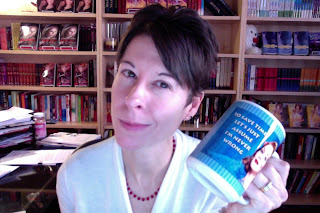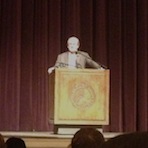STATUS: Another phone conference in 20 minutes! Must blog quickly.
What’s playing on the XM or iPod right now? LOWDOWN by Boz Scaggs
Blog readers, have I got special treat for you today. If you ever wondered what the editor rejections looked like for a book that has shown every sign of coming out of the gate wildly popular, well today is your lucky day.
Today is the official release day for Kristen Callihan’s FIRELIGHT.

I’ve blogged before about the fact that I almost could not sell this book. And today, Kristen has given me special permission to share her rejections.
But let me preface this.
This debut novel has received two starred reviews (Publishers Weekly and Library Journal) and top pick at any number of romance sites, too many to list here.
When we sent the novel out to already established and successful authors to read with an eye for a possible blurb, we had our fingers crossed that maybe we’d get one or two responses.
Every author on our list read and blurbed it:
“Callihan has a great talent for sexual tension and jaw-dropping plots that weave together brilliantly in the end.”
—Diana Gabaldon, New York Times bestselling author of Outlander
“A sizzling paranormal with dark history and explosive magic! Callihan is an impressive new talent.” —Larissa Ione, New York Times bestselling author of Immortal Rider
“Evocative and deeply romantic, Firelight is a beautiful debut. I was fascinated from the first page.” —Nalini Singh, New York Times bestselling author of the Guild Hunter Series
“Passionate and sizzling, beautifully written and dark. This unique paranormal twist on the beauty and the beast tale rocks!”
—Elizabeth Amber, author of Bastian The Lords of Satyr
“Kristen Callihan delivers a dark, lush offering to fans of gothic and paranormal romance. With a deliciously tortured hero, an inventive supernatural mystery, and slow-building heat that simmers on each page, Firelight is a sexy, resplendent debut. I can’t wait to see what Kristen Callihan comes up with next!”
—Meljean Brook, New York Times bestselling author of The Iron Duke
“This book has everything: sword fights, magic, despair, a heroine with secret strengths, a hero with hidden vulnerability, and best of all, a true love that’s hot enough to burn the pages. I couldn’t stop reading. This book is utterly phenomenal.”
—Courtney Milan, New York Times and USA Today bestselling author of Unraveled
“Inventive and adventurous with complex, witty characters and snappy writing. Callihan will make you believe in the power of destiny and true love.”
—Shana Abé, New York Times bestselling author of The Time Weaver
“A dark, delicious tale of secrets, murder, and love, beautifully shrouded in the shadows of Victorian London.”
—Hannah Howell, New York Times bestselling author of If He’s Dangerous
“A dazzling debut, sexy and thrilling. Callihan now has a place on my to-buy list.”
—Anya Bast, New York Times bestselling author of Dark Enchantment
“A fantastic debut that has everything I’m looking for in a story: compelling conflict, beautiful writing, gripping sexual tension, and strong, intelligent characters.”
—Sherry Thomas, RITA-award winning author of Not Quite A Husband and His At Night
“A compelling and emotional pageturner that will have readers burning the midnight oil.” —Anna Campbell, award-winning author of Midnight’s Wild Passion
“Lush and imaginative, Firelight will sweep you away.”
—Zoë Archer, award-winning author of Devil’s Kiss
“Combines romance, wit, and suspense in a fabulous retelling of Beauty and the Beast…with a supernatural twist.”
—Colleen Gleason, international bestselling author of The Gardella Vampire Chronicles
“I LOVED the book! Fabulous writing, great characters, innovative plot. It held me from the first page. I was so drawn in by the quality of the writing. She’s sure to become a fave of mine. I have already raved about the book to my readers group.”
—Gail Link, 2010 RWA Bookseller of the Year
And yet, the editors did not feel the same love.
–I’m afraid I didn’t love the voice, which felt a little bit overdone to me, and this kept me from getting immersed in the story. I’m therefore going to pass; I’m sorry. But thank you for giving me a shot at this, and I hope you will find the right home for it.
–I love your description of the story, but for me, the writing itself doesn’t stand out from the crowd.
–Thanks so much for sending this! I liked the reimagining of the beauty-and-the-beast story, but didn’t quite love the voice as much as I’d hoped
–I do love a great gothic, so I was really hoping to love this. Unfortunately, I just didn’t connect with the voice as much as I wanted to.
–Many thanks for thinking of us for this, but we’re going to pass. Gothics are very hard to sell right now
–I’ve been reading this, and I’ve enjoyed the appealing voice and the strong element of mystery. But while I liked this novel perfectly fine, I just didn’t feel the level of enthusiasm necessary to make this a success. Ultimately I just didn’t feel the strong emotional connection I’d hoped for.
–I really tried hard to get emotionally attached to FIRELIGHT because the atmosphere is so beautifully written. I just couldn’t connect, I’m sad to say,
–I did find plenty to like in the manuscript: Miranda makes a great heroine, and I absolutely loved our introduction to her in the opening chapters. (In particular, the scene where Miranda is having the ethical dilemma over whether to steal or not really hooked me.) The main problem I have, though, is that I never really connected with Archer as a hero. Miranda won me over, but she alone wasn’t enough to make me believe in the romance.
–Here’s the thing-I kept hoping I could make this work, but increasingly we’re having a hard time making new historical romance authors grow in the market.
In the end, it’s so so true that you have to find the right editor with the right vision who is the right fit. When you do, even for a book that almost didn’t sell, it can be magic.
And I think Kristen’s holiday gift to me is the perfect end note!

Happy release day Kristen!







